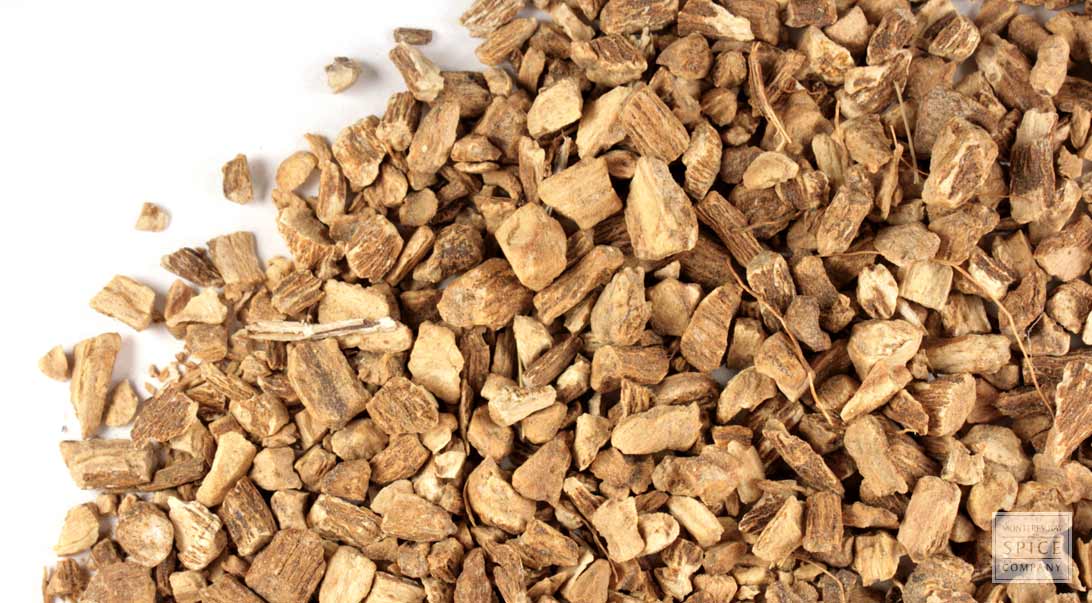Elecampane is also known by its scientific name, Inula Helenium, and looks like a common sunflower. This is not surprising because both of these plants belong to the same plant family, called Asteraceae. It also has nicknames such as horse-heal and elf dock. Unlike the common sunflower, which was brought to Europe from the Americas, elecampanes are native to Eurasia, were naturalised in the North Americas and they have been used as food and medicine for different health conditions since ancient times.
Not as well-known as many other teas but popularised through history for its respiratory benefits, Elecampane Root Tea has a complex flavour profile, that’s bitter yet spicy and warm flavour, with some describing it as a stronger ginger, and is made from dried roots of the plant.
History and Tradition
There are many stories surrounding the Elecampane. According to a popular Greek legend, Helen of Troy was so broken-hearted when she was abducted from Sparta by Paris that the elecampane plant emerged from where her tears fell. Hence, one of its names which is “helenium” was derived from her name. A different version says that Helen is said to have carried its flower in her hair as she was abducted from her homeland. For others, this was used by her as an antidote against venomous bites. Another story claims that this herb originated from the island of Helena where the best crop of elecampane grew.
Historical references which mentioned the use of Elecampane as medicine and condiment include the Natural History, an ancient encyclopedia which was written by Pliny the Elder, a Roman naturalist and natural philosopher. It was he who mentioned that its roots were good for digestion. Hippocrates, an ancient Greek physician also believed in its healing abilities and attributed elecampane as a stimulant to the kidneys, uterus, stomach, and brain.
The use of elecampane as a medicinal herb was widespread in ancient times and the middle ages. Aside from its healing benefits, the said plant was also used as food, particularly in medieval Europe where the roots were candied and eaten as sweets.
Benefits for the Respiratory Health
The elecampane plant has been considered a healing herb for the respiratory system since time immemorial. In Europe, it was traditionally used as a tonic for respiratory, digestive problems, and menstrual cramps. In Ayurveda and traditional Chinese medicine, it is being used to treat asthma and bronchitis. The elecampane root is believed to be very effective in treating different kinds of respiratory illnesses. In fact, during the 1800s, people used lozenges and cough drops which were made from this part of the plant.
The elecampane root when made into tea has a spicy and warming flavour which can help stimulate appetite and improve the function of the digestive system. Like other products made of this root, this herbal tea is also as effective when it comes to maintaining one’s respiratory health for the following reasons:
-
It has antimicrobial properties
Because it is a good antimicrobial, a cup of elecampane root tea can help treat respiratory tract infections such as the common cold, sinusitis, tonsillitis, laryngitis, and bronchitis. There is also laboratory research that suggests that elecampane extracts may fight Mycobacterium tuberculosis, the bacteria that cause the disease, tuberculosis. - It is a good source of inulin, which acts as an expectorant and helps to treat coughs by soothing the bronchial passages, reduces bronchial secretions, and cleanse the lungs of congestions.
-
It contains alantolactone, which can suppress airway inflammation.
Some researchers suggest that it may help patients who suffer from chronic obstructive pulmonary disease or COPD, a chronic inflammatory lung disease that can be developed from smoking. Symptoms include cough mucus production, breathing difficulty, and wheezing. Since alantolactone can also help treat cough, soothe irritation that results from coughing, and suppress inflammation caused by cigarette smoke exposure, it may help open airways and give relief to COPD patients as well.
Whilst this herbal tea is undoubtedly very nutritious and helpful to people who want to keep their respiratory and immune systems healthy, it is still best to seek medical advice when it comes to treating any diseases and health conditions.
If you’re looking for a new tea that may help your respiratory system or a new complex flavour to your tea repertoire, you can check out our elecampane root tea or check out the full range of Herbal Teas at Tea Life!.


Share:
6 Amazing tea's that help reduce period pain
Cardamom Pods - Ancient, Traditional, and Modern Benefits